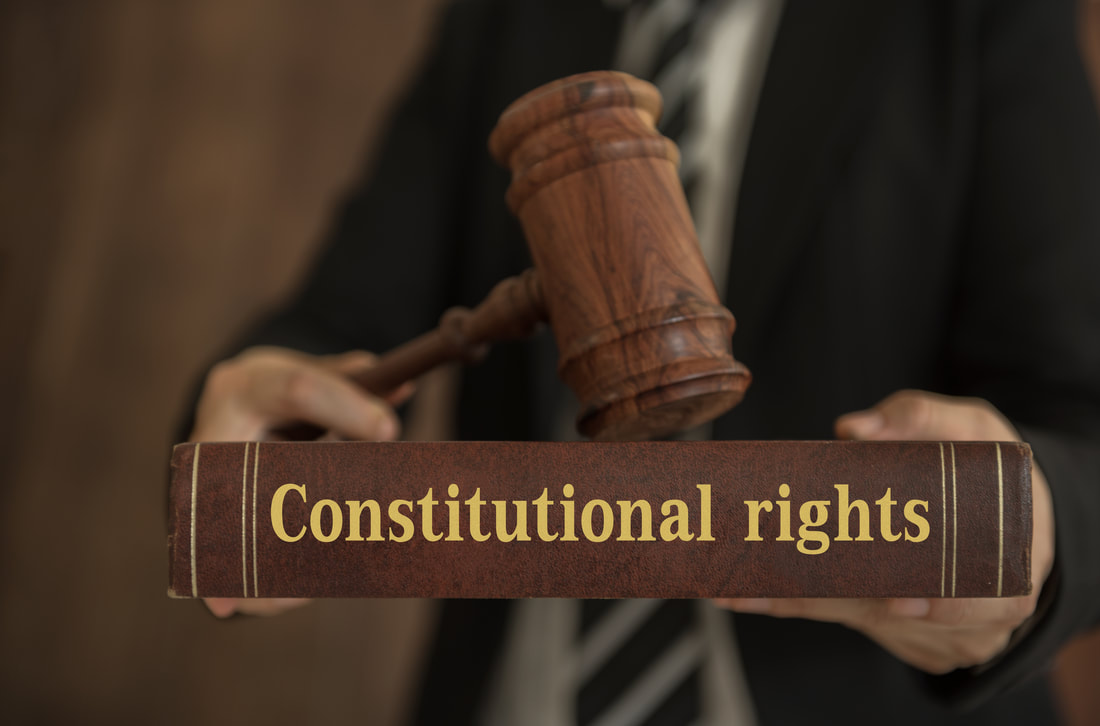Oregon Constitution - Article 1 - Bill of Rights
|
There is much talk about the Constitution these days and a lot of argument on many topics supposedly based on the Constitution – especially the Bill of Rights. Even though the Oregon Constitution is readily available and for the most part easy to read and understand, it’s rare to find someone who has recently read the Oregon Bill of Rights, let alone someone who is conversant in it.
|
Reflect on the governor’s mandates and the restrictions imposed on Oregonians by the executive branch and consider for yourself the Constitutionality of those orders. |
Therefore, for your reading pleasure, the following is an extract from the Oregon Bill of Rights. A few Sections have been removed as too lengthy and not pertinent to the regular daily affairs of Oregonians. I’ve highlighted the Sections of the Oregon Bill of Rights that I believe have been violated in recent legislative sessions and certainly by the governor and executive branch over the last couple years. Read them carefully and reflect on the governor’s mandates and the restrictions imposed on Oregonians by the executive branch and consider for yourself the Constitutionality of those orders. With an election coming up, let’s put people in office who will abide by the terms of the US and Oregon Constitution and protect the rights of the people.
Section 1. Natural rights inherent in people. We declare that all men, when they form a social compact are equal in right: that all power is inherent in the people, and all free governments are founded on their authority, and instituted for their peace, safety, and happiness; and they have at all times a right to alter, reform, or abolish the government in such manner as they may think proper.
Section 2. Freedom of worship. All men shall be secure in the Natural right, to worship Almighty God according to the dictates of their own consciences.
Section 3. Freedom of religious opinion. No law shall in any case whatever control the free exercise, and enjoyment of religious opinions, or interfere with the rights of conscience.
Section 4. No religious qualification for office. No religious test shall be required as a qualification for any office of trust or profit.
Section 5. No money to be appropriated for religion. No money shall be drawn from the Treasury for the benefit of any religious, or theological institution, nor shall any money be appropriated for the payment of any religious services in either house of the Legislative Assembly.
Section 6. No religious test for witnesses or jurors. No person shall be rendered incompetent as a witness, or juror in consequence of his opinions on matters of religion; nor be questioned in any Court of Justice touching his religious belief to affect the weight of his testimony.
Section 7. Manner of administering oath or affirmation. The mode of administering an oath, or affirmation shall be such as may be most consistent with, and binding upon the conscience of the person to whom such oath or affirmation may be administered.
Section 8. Freedom of speech and press. No law shall be passed restraining the free expression of opinion, or restricting the right to speak, write, or print freely on any subject whatever; but every person shall be responsible for the abuse of this right.
Section 9. Unreasonable searches or seizures. No law shall violate the right of the people to be secure in their persons, houses, papers, and effects, against unreasonable search, or seizure; and no warrant shall issue but upon probable cause, supported by oath, or affirmation, and particularly describing the place to be searched, and the person or thing to be seized.
Section 10. Administration of justice. No court shall be secret, but justice shall be administered, openly and without purchase, completely and without delay, and every man shall have remedy by due course of law for injury done him in his person, property, or reputation.
Section 11. Rights of Accused in Criminal Prosecution. In all criminal prosecutions, the accused shall have the right to public trial by an impartial jury in the county in which the offense shall have been committed; to be heard by himself and counsel; to demand the nature and cause of the accusation against him, and to have a copy thereof; to meet the witnesses face to face, and to have compulsory process for obtaining witnesses in his favor;
Section 12. Double jeopardy; compulsory self-incrimination. No person shall be put in jeopardy twice for the same offense, nor be compelled in any criminal prosecution to testify against himself.
Section 13. Treatment of arrested or confined persons. No person arrested, or confined in jail, shall be treated with unnecessary rigor.
Section 14. Bailable offenses. Offenses, except murder, and treason, shall be bailable by sufficient sureties. Murder or treason, shall not be bailable, when the proof is evident, or the presumption strong.
Section 15. Foundation principles of criminal law. Laws for the punishment of crime shall be founded on these principles: protection of society, personal responsibility, accountability for one's actions and reformation.
Section 16. Excessive bail and fines; cruel and unusual punishments; power of jury in criminal case. Excessive bail shall not be required, nor excessive fines imposed. Cruel and unusual punishments shall not be inflicted, but all penalties shall be proportioned to the offense. In all criminal cases whatever, the jury shall have the right to determine the law, and the facts under the direction of the Court as to the law, and the right of new trial, as in civil cases.
Section 17. Jury trial in civil cases. In all civil cases the right of Trial by Jury shall remain inviolate.
Section 18. Private property or services taken for public use. Private property shall not be taken for public use, nor the particular services of any man be demanded, without just compensation; nor except in the case of the state, without such compensation first assessed and tendered; provided, that the use of all roads, ways and waterways necessary to promote the transportation of the raw products of mine or farm or forest or water for beneficial use or drainage is necessary to the development and welfare of
Section 19. Imprisonment for debt. There shall be no imprisonment for debt, except in case of fraud or absconding debtors.
Section 20. Equality of privileges and immunities of citizens. No law shall be passed granting to any citizen or class of citizens privileges, or immunities, which, upon the same terms, shall not equally belong to all citizens.
Section 21. Ex-post facto laws; laws impairing contracts; laws depending on authorization in order to take effect; laws submitted to electors. No ex-post facto law, or law impairing the obligation of contracts shall ever be passed, nor shall any law be passed, the taking effect of which shall be made to depend upon any authority, except as provided in this Constitution; provided, that laws locating the Capitol of the State, locating County Seats, and submitting town, and corporate acts, and other local, and Special laws may take effect, or not, upon a vote of the electors interested.
Section 22. Suspension of operation of laws. The operation of the laws shall never be suspended, except by the Authority of the Legislative Assembly.
Section 23. Habeas corpus. The privilege of the writ of habeas corpus shall not be suspended unless in case of rebellion, or invasion the public safety requires it.
Section 24. Treason. Treason against the State shall consist only in levying war against it, or adhering to its enemies, giving them aid or comfort. No person shall be convicted of treason unless on the testimony of two witnesses to the same overt act, or confession in open Court.
Section 26. Assemblages of people; instruction of representatives; application to legislature. No law shall be passed restraining any of the inhabitants of the State from assembling together in a peaceable manner to consult for their common good; nor from instructing their Representatives; nor from applying to the Legislature for redress of grievances.
Section 27. Right to bear arms; military subordinate to civil power. The people shall have the right to bear arms for the defense of themselves, and the State, but the Military shall be kept in strict subordination to the civil power.
32. Taxes and duties; uniformity of taxation. No tax or duty shall be imposed without the consent of the people or their representatives in the Legislative Assembly; and all taxation shall be uniform on the same class of subjects within the territorial limits of the authority levying the tax.
Section 33. Enumeration of rights not exclusive. This enumeration of rights, and privileges shall not be construed to impair or deny others retained by the people.
Section 34. Slavery or involuntary servitude. There shall be neither slavery, nor involuntary servitude in the State, otherwise than as a punishment for crime, whereof the party shall have been duly
Section 46. Prohibition on denial or abridgment of rights on account of sex. (1) Equality of rights under the law shall not be denied or abridged by the State of Oregon or by any political subdivision in this state on account of sex.
Section 1. Natural rights inherent in people. We declare that all men, when they form a social compact are equal in right: that all power is inherent in the people, and all free governments are founded on their authority, and instituted for their peace, safety, and happiness; and they have at all times a right to alter, reform, or abolish the government in such manner as they may think proper.
Section 2. Freedom of worship. All men shall be secure in the Natural right, to worship Almighty God according to the dictates of their own consciences.
Section 3. Freedom of religious opinion. No law shall in any case whatever control the free exercise, and enjoyment of religious opinions, or interfere with the rights of conscience.
Section 4. No religious qualification for office. No religious test shall be required as a qualification for any office of trust or profit.
Section 5. No money to be appropriated for religion. No money shall be drawn from the Treasury for the benefit of any religious, or theological institution, nor shall any money be appropriated for the payment of any religious services in either house of the Legislative Assembly.
Section 6. No religious test for witnesses or jurors. No person shall be rendered incompetent as a witness, or juror in consequence of his opinions on matters of religion; nor be questioned in any Court of Justice touching his religious belief to affect the weight of his testimony.
Section 7. Manner of administering oath or affirmation. The mode of administering an oath, or affirmation shall be such as may be most consistent with, and binding upon the conscience of the person to whom such oath or affirmation may be administered.
Section 8. Freedom of speech and press. No law shall be passed restraining the free expression of opinion, or restricting the right to speak, write, or print freely on any subject whatever; but every person shall be responsible for the abuse of this right.
Section 9. Unreasonable searches or seizures. No law shall violate the right of the people to be secure in their persons, houses, papers, and effects, against unreasonable search, or seizure; and no warrant shall issue but upon probable cause, supported by oath, or affirmation, and particularly describing the place to be searched, and the person or thing to be seized.
Section 10. Administration of justice. No court shall be secret, but justice shall be administered, openly and without purchase, completely and without delay, and every man shall have remedy by due course of law for injury done him in his person, property, or reputation.
Section 11. Rights of Accused in Criminal Prosecution. In all criminal prosecutions, the accused shall have the right to public trial by an impartial jury in the county in which the offense shall have been committed; to be heard by himself and counsel; to demand the nature and cause of the accusation against him, and to have a copy thereof; to meet the witnesses face to face, and to have compulsory process for obtaining witnesses in his favor;
Section 12. Double jeopardy; compulsory self-incrimination. No person shall be put in jeopardy twice for the same offense, nor be compelled in any criminal prosecution to testify against himself.
Section 13. Treatment of arrested or confined persons. No person arrested, or confined in jail, shall be treated with unnecessary rigor.
Section 14. Bailable offenses. Offenses, except murder, and treason, shall be bailable by sufficient sureties. Murder or treason, shall not be bailable, when the proof is evident, or the presumption strong.
Section 15. Foundation principles of criminal law. Laws for the punishment of crime shall be founded on these principles: protection of society, personal responsibility, accountability for one's actions and reformation.
Section 16. Excessive bail and fines; cruel and unusual punishments; power of jury in criminal case. Excessive bail shall not be required, nor excessive fines imposed. Cruel and unusual punishments shall not be inflicted, but all penalties shall be proportioned to the offense. In all criminal cases whatever, the jury shall have the right to determine the law, and the facts under the direction of the Court as to the law, and the right of new trial, as in civil cases.
Section 17. Jury trial in civil cases. In all civil cases the right of Trial by Jury shall remain inviolate.
Section 18. Private property or services taken for public use. Private property shall not be taken for public use, nor the particular services of any man be demanded, without just compensation; nor except in the case of the state, without such compensation first assessed and tendered; provided, that the use of all roads, ways and waterways necessary to promote the transportation of the raw products of mine or farm or forest or water for beneficial use or drainage is necessary to the development and welfare of
Section 19. Imprisonment for debt. There shall be no imprisonment for debt, except in case of fraud or absconding debtors.
Section 20. Equality of privileges and immunities of citizens. No law shall be passed granting to any citizen or class of citizens privileges, or immunities, which, upon the same terms, shall not equally belong to all citizens.
Section 21. Ex-post facto laws; laws impairing contracts; laws depending on authorization in order to take effect; laws submitted to electors. No ex-post facto law, or law impairing the obligation of contracts shall ever be passed, nor shall any law be passed, the taking effect of which shall be made to depend upon any authority, except as provided in this Constitution; provided, that laws locating the Capitol of the State, locating County Seats, and submitting town, and corporate acts, and other local, and Special laws may take effect, or not, upon a vote of the electors interested.
Section 22. Suspension of operation of laws. The operation of the laws shall never be suspended, except by the Authority of the Legislative Assembly.
Section 23. Habeas corpus. The privilege of the writ of habeas corpus shall not be suspended unless in case of rebellion, or invasion the public safety requires it.
Section 24. Treason. Treason against the State shall consist only in levying war against it, or adhering to its enemies, giving them aid or comfort. No person shall be convicted of treason unless on the testimony of two witnesses to the same overt act, or confession in open Court.
Section 26. Assemblages of people; instruction of representatives; application to legislature. No law shall be passed restraining any of the inhabitants of the State from assembling together in a peaceable manner to consult for their common good; nor from instructing their Representatives; nor from applying to the Legislature for redress of grievances.
Section 27. Right to bear arms; military subordinate to civil power. The people shall have the right to bear arms for the defense of themselves, and the State, but the Military shall be kept in strict subordination to the civil power.
32. Taxes and duties; uniformity of taxation. No tax or duty shall be imposed without the consent of the people or their representatives in the Legislative Assembly; and all taxation shall be uniform on the same class of subjects within the territorial limits of the authority levying the tax.
Section 33. Enumeration of rights not exclusive. This enumeration of rights, and privileges shall not be construed to impair or deny others retained by the people.
Section 34. Slavery or involuntary servitude. There shall be neither slavery, nor involuntary servitude in the State, otherwise than as a punishment for crime, whereof the party shall have been duly
Section 46. Prohibition on denial or abridgment of rights on account of sex. (1) Equality of rights under the law shall not be denied or abridged by the State of Oregon or by any political subdivision in this state on account of sex.



